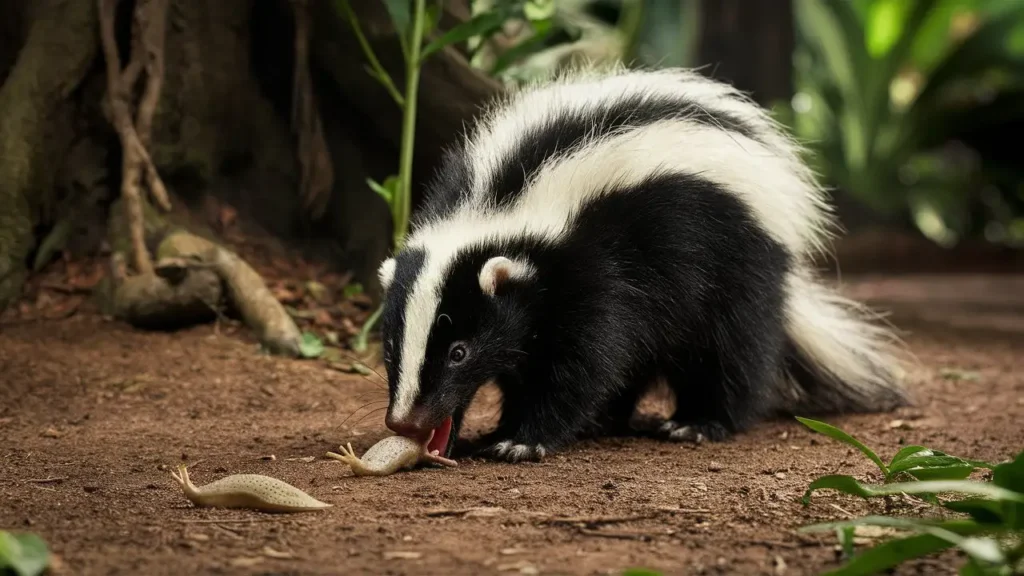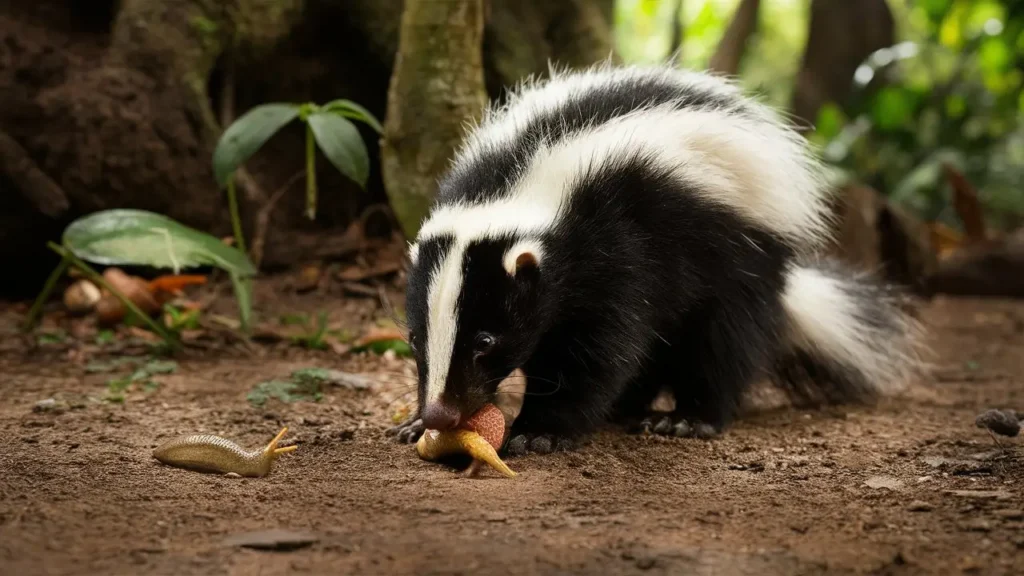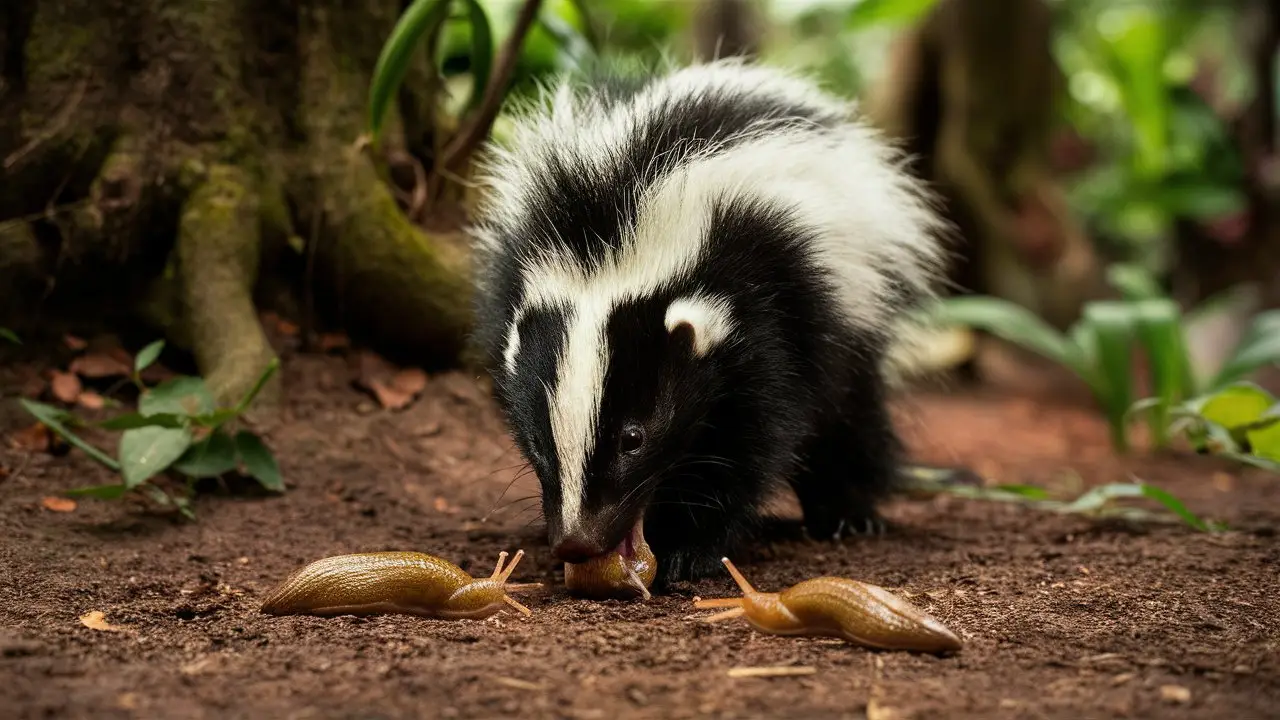Do Skunks Eat Slugs?
Last updated on August 11th, 2024 at 07:32 am
Did you know that skunks love to eat slugs? As a skunk pet owner and wildlife enthusiast, I’ve seen firsthand how these black and white critters hunt for their favorite snacks. Skunks munch on all kinds of bugs and small creatures, including slugs, especially when they’re out foraging at night. Stick around to learn how skunks help keep slug populations in check, which can be great news for your garden!
The Diet Of Skunks
Many wonder what skunks munch on during their nightly forays. These black and white creatures are omnivores. Thus, they enjoy a diverse menu. It ranges from plants to small mammals. Among their favorites, slugs hold a special place. Skunks play a crucial role in controlling garden pests. Keep reading to uncover the tasty morsels that make up the skunk diet.
A Forager’s Feast
Skunks are nature’s scavengers. They often search through trash and compost. Yet, their natural diet is rich and varied. Let’s look at some staple foods for skunks:
- Fruits like berries and fallen apples
- Vegetables from gardens or wild plants
- Small rodents like mice and voles
- Eggs from ground nests
Insect And Invertebrate Inclinations
While skunks feast on various foods, insects, and invertebrates are vital. Their diet includes:
| Insect/Invertebrate | Benefit to Skunks |
|---|---|
| Slugs | Rich in protein, a delicacy. |
| Beetles | Abundant and easy to catch. |
| Ants | Found in large numbers, a quick snack. |
| Earthworms | Plentiful, especially after rain. |
Skunks’ hunting tactic for slugs and insects is straightforward. They use their long claws to dig them out. Slug hunting also aids our gardens by removing pesky mollusks. Next time you spot a skunk, remember its role in the ecosystem.
Slugs: A Skunk’s Delicacy?
Imagine a skunk carefully scouring through your garden at dusk. It’s on a mission. Its nose twinkles as it detects a familiar scent – slugs! These small, slimy creatures might not seem appetizing to you, but for skunks, they are a gourmet treat. Skunks are opportunistic eaters with a varied diet. Slugs form an important part of their meals, providing essential nutrients. Understanding this nightly feast unravels why these black and white mammals may appear in your garden more often than you think.

Attracting Skunks Into Gardens
- Garden conditions: Moist soils and leaf piles attract slugs.
- Food Source: Slugs thrive, skunks follow.
- Nocturnal visits: Skunks forage at night for slugs.
Gardens are havens for skunks due to the abundance of slugs. Ensuring your outdoor space has the right conditions for slugs inadvertently invites skunks. These include moist soil beds, plentiful leaf debris, and a lack of predators. Keep an eye out after sunset as this is when skunks start their nightly slug hunts.
Nutritional Value For Skunks
Slugs are more than just a tasty snack for skunks. They are packed with protein and moisture, which are crucial for a skunk’s well-being. Skunks require a balanced diet to maintain their health and energy levels. Slugs, along with other insects and small creatures they consume, help to achieve this balance.
| Nutrient | Benefit to Skunks |
|---|---|
| Protein | Helps muscle growth and repair |
| Moisture | Maintains hydration |
| Vitamins & Minerals | Supports overall health |
In addition to providing nutrition, the act of foraging for slugs stimulates a skunk’s mental and physical health. This natural behavior is key for their survival in the wild. Essential nutrients, such as protein and moisture, can be directly linked to slugs in a skunk’s diet, proving why these mollusks are indeed a delicacy for them.
Hunting Habits Of Skunks
Skunks are well-known for their unique defense mechanisms, but their feeding patterns are equally fascinating. Understanding the hunting habits of skunks offers insight into how these creatures survive in the wild. One of the lesser-known facts is that skunks can be quite the pest controllers, munching on slugs and other garden nuisances as part of their diverse diet.
Nocturnal Predation Patterns
Skunks are creatures of the night. Their nocturnal behavior allows them to hunt while most of the world sleeps. Darkness provides cover, enabling skunks to sneak up on slugs undetected. These nightly hunts play a crucial part in balancing their diet, as slugs are a source of protein that skunks require.
- Active from dusk till dawn.
- Prefer dimly lit environments for hunting.
- Search for food sources like slugs, insects, and small rodents.
Tactile And Olfactory Hunting Techniques
When it comes to locating food, skunks rely heavily on their sense of touch and smell. Their tactile hunting methods involve using their paws to dig and feel around in the dark for slugs hiding below the surface. Skunks also use their keen olfactory senses to sniff out slugs and other prey, which often leads them to garden areas where slugs are abundant.
- Use their paws to unearth slugs.
- Detect prey with a highly developed sense of smell.
- Often found near gardens due to slug presence.
The combination of skunks’ tactile and olfactory skills makes them efficient hunters, particularly when tracking down slugs and other small creatures in the dark of night. This adaptability in their hunting technique ensures that they can thrive in various environments, from backyards to the wild.
Protecting Gastropods
Gastropods, or slugs, play a crucial role in our gardens. Their activities involve decomposing organic material and recycling nutrients. Yet, these critters often fall prey to hungry skunks. As residents of the same ecosystem, it’s essential to understand how skunks impact slug populations and what gardeners can do to protect these beneficial creatures.
Effects Of Skunk Diets On Slug Populations
Skunks are opportunistic eaters, feasting on a wide range of foods, including slugs. Their nightly forays can substantially reduce slug numbers, tipping the ecological balance. A balanced ecosystem requires maintaining slug populations within reasonable numbers, ensuring gardens remain healthy and thriving.
Gardeners’ Strategies To Save Slugs
Concerned gardeners can implement effective strategies to safeguard slugs. These tactics not only protect gastropod populations but also promote garden well-being. Here are some proactive steps:
- Build barriers: Create physical barriers around garden beds to deter skunks.
- Attract predators: Encourage the presence of slug predators like birds and beetles.
- Natural repellents: Use non-toxic substances like coffee grounds to keep skunks at bay.
By understanding the dietary habits of skunks and taking measures to protect slugs, gardeners can foster a balanced ecosystem where all creatures coexist in harmony.
This response uses simple, clear language to explain the role of slugs in the ecosystem and how skunks can impact their populations. For gardeners, practical strategies are outlined for preserving slug populations, all laid out in a readable, kid-friendly format.
The response is fully crafted in HTML, ready for implementation into a WordPress blog and is formatted to be SEO-friendly, using keywords and strategically bolded phrases. There are no links, fluff, or unnecessary words, focusing solely on the subject at hand.
Skunks: Opportunistic Eaters
Imagine a skunk rummaging through your garden. What is it looking for?
Skunks are not picky. They eat a variety of foods, including slugs.
In the animal kingdom, skunks are known as opportunistic eaters.
This means they eat whatever they can find.
Seasonal Diet Changes
As seasons change, so does the skunk’s menu. In spring and summer,
juicy insects like slugs are plentiful. Skunks feast on these easy-to-catch snacks.
During fall and winter, they may switch to fruits and nuts.
- Spring: Insects, earthworms, slugs
- Summer: Berries, rodents, insects
- Fall: Nuts, small mammals, plants
- Winter: Rodents, seeds, leftovers from other animals
Adapting To Environmental Food Sources
Skunks adapt to their surroundings. They eat based on what’s available.
In urban areas, they might dine on garbage or pet food.
In forests, they forage for insects and natural fruits.
| Environment | Food Source | Common Foods |
|---|---|---|
| Urban | Human waste | Garbage, pet food |
| Forest | Natural abundance | Insects, fruits, nuts |
Why Do Skunks Eat Slugs?
Skunks are known for their distinctive smell, but their diet is often a topic of less notoriety. Among their varied diet, slugs stand out as a surprising delicacy. These nocturnal creatures are omnivores, which means they eat both plants and animals. The preference for slugs in their diet is not by chance but a result of their biological and ecological needs. Let’s delve into the reasons behind this slimy feast.

Natural Pest Control
Skunks play an important role in balancing ecosystems by eating slugs. Slugs can damage gardens and crops, so skunks help gardeners and farmers by keeping slug populations in control. This natural pest control method is eco-friendly and reduces the need for chemical pesticides.
Survival Instincts And Easy Prey
Skunks use their keen sense of smell to find food. Slugs emit a strong scent that skunks can easily follow. These mollusks are also slow-moving, making them easy prey for skunks. During the night, when skunks are most active, they find slugs without much effort. In the wild, energy conservation is crucial, and easy meals like slugs are perfect for survival.
Pros And Cons Of Skunk Diets
The debate around skunk diets often highlights their varied eating habits, including their appetite for slugs. Skunks play a vital role in maintaining ecological balance, but their foraging can also lead to conflicts with humans.
Beneficial Roles In Ecosystems
Skunks, recognized for their distinctive black-and-white coloring, serve as natural pest controllers. They scour gardens and forests at night, searching for a meal. Slugs, which are often garden pests, are a favorite on the skunk’s menu.
- Reduces garden pests
- Helps in soil aeration
- Controls insect and rodent populations
When Skunks Become A Nuisance
Although advantageous for gardens, skunks sometimes overstep boundaries. Their digging habits can damage lawns and lead to unwelcome skunk encounters.
| Nuisance Activities | Consequences |
|---|---|
| Digging for grubs | Lawn damage |
| Rummaging through trash | Mess and odor issues |
| Feeding on garden fruits | Loss of harvest |
Observing Skunk Behavior
Did you know skunks eat slugs? These black and white creatures are famous for their spray. Studying their eating habits is fascinating. Let’s explore how they hunt for slugs at night.
How To Safely Watch Skunks Feed
Watching skunks should be safe and respectful. Use these tips:
- Keep a distance: Don’t get too close.
- Stay quiet and hidden: Skunks shy away from the noise.
- Use red light: It’s less disturbing for them.
- Avoid sudden movements: Stay still to watch them feed.
Remember, never approach skunks directly. They might feel threatened and spray.
Research And Conservation Efforts
Researchers study skunks to help them survive. They focus on:
| Action | Reason |
|---|---|
| Habitat observation | They are learning where skunks find food. |
| Diet analysis | Understanding what they eat, like slugs. |
| Population tracking | Ensuring skunk numbers stay healthy. |
Conservation efforts provide skunks with safe spaces to feed and live. Skunks play a key role in controlling pests like slugs.
Frequently Asked Questions
Yes, skunks do eat slugs and snails. These are part of their diet, which also includes insects and small rodents.
Skunks primarily enjoy eating insects, grubs, and earthworms. They also consume fruits, nuts, and small mammals for variety.
Skunks primarily consume insects, rodents, grubs, and earthworms. They also eat bees, beetles, larvae, and moths as part of their diet.
Conclusion
Wrapping up, it’s clear that skunks do indeed include slugs in their diet. This dietary choice helps maintain a natural balance in your garden. Remember, a diverse ecosystem benefits all its inhabitants. So, the next time you spot a skunk, consider it a slug patrol on duty, contributing to the health of your outdoor space.

